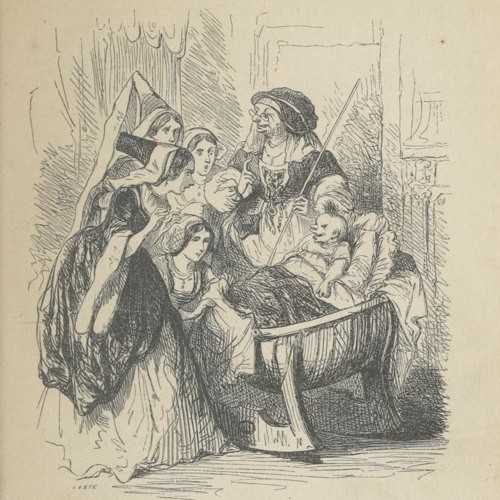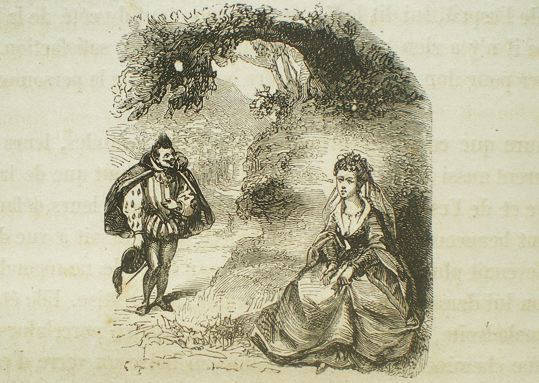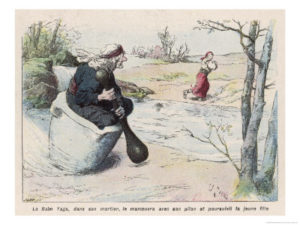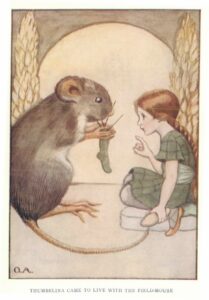
Riquet with the tuff
LIRE
Original tale by Charles Perrault modernized in 1902 by Pierre Féron. Illustrations by Gustave Doré, 1902 and other unsigned engravings.
Once upon a time there was a queen who had a son so ugly and so badly made, that it was doubted for a long time if he had human form. A fairy, who was at his baptism, assured that he would not leave to be lovable, because he would have a lot of spirit: she even added that he could, by virtue of the gift she had just made him, give as much spirit as he would have to the person he would marry.
All this consoled the poor queen a little, who was very sad to have such an ugly child. It is true that this child did not begin to speak any sooner, that he said a thousand pretty things, and that he had in all his actions something so spiritual, that one was charmed. I forgot to say that he had a little tuft of hair on his head, which made them name him Riquet à la Houppe, because Riquet was the name of the family.
The queen of a neighboring kingdom had two daughters. The first was more beautiful than day. The same fairy who had witnessed the birth of little Riquet à la Houppe, wanted to moderate the queen’s joy; she told her that this little princess would have no mind, and that she would be as stupid as she was beautiful. This greatly mortified the queen; but she had a much greater grief, for her second daughter was extremely ugly. Do not grieve so much, madam,” said the fairy, “your daughter will be rewarded, and she will have so much spirit, that it will hardly be noticed that she lacks beauty. – God willing,” replied the queen, “but isn’t there some way of making the elder daughter have a little spirit? – I can do nothing for her, madam, as far as wit is concerned,” said the fairy; “but I can do everything as far as beauty is concerned; and, as there is nothing that I do not want to do for your satisfaction, I will give her the gift of being able to make the person she likes beautiful.
As these two princesses became great, their perfections also grew with them, and everywhere was spoken of only the beauty of the elder and the spirit of the younger. It is true that their defects increased a lot with age. The younger one grew uglier by the day, and the older one became stupider by the day. Either she didn’t answer anything that was asked of her, or she said something stupid. She was so clumsy that she couldn’t put away four china pieces on the edge of a fireplace without breaking one, nor drink a glass of water without spilling half of it on her clothes.
Although beauty is a great advantage, the younger girl almost always prevailed over the older one in all companies. At first they went to the older one to see and admire her, but soon afterwards they went to the one who had more spirit, to hear her say a thousand pleasant things; and they were astonished that in less than a quarter of an hour the older one had no one near her, and that everyone had arranged themselves around the younger one. The elder one, although very stupid, noticed it well; and she would have given without regret all her beauty to have half the spirit of her sister. The queen, all wise as she was, could not prevent herself from reproaching her several times for her stupidity: which thought to make die of pain this poor princess.
One day, when she had retired to a wood to complain about her misfortune, she saw a very ugly and unpleasant little man coming towards her, but dressed very beautifully. It was the young prince Riquet à la Houppe, who had left his father’s kingdom to see her and talk to her. He approached her with all the respect and politeness imaginable. Having noticed, after having paid her the usual compliments, that she was very melancholic, he said to her: “I do not understand, madam, how a person can be so sad as you seem to be; for, although I can boast of having seen an infinite number of people, I can say that I have never seen any whose distinction approaches yours.
– That pleases you to say, sir,” replied the princess and left it at that. – The beauty, resumed Riquet à la Houppe, is a great advantage, and, when one possesses it, I do not see that there is nothing which can afflict us much.
– I would rather be as ugly as you are, and have a mind, than to be as beautiful as I am, and as stupid as I am,” said the princess.
– There is nothing, madam, that shows more that one has spirit, than to believe that one has none, and it is natural that, the more one has, the more one believes that one lacks.
– You may be right,” said the princess, “but I know that I am very stupid, and that is where the grief that is killing me comes from.
– If this is all that is afflicting you, madam, I can easily put an end to your pain.
– And how will you do it?” said the princess.
– I have the power, madam,” said Riquet à la Houppe, “to give as much spirit as one can have to the person I am to marry; and as you are, madam, that person, it will only be up to you to have as much spirit as one can have, provided you are willing to marry me.
The princess remained quite forbidden, and answered nothing. I see,” said Riquet à la Houppe, “that this proposal distresses you, and I am not surprised; but I give you a whole year to resolve to do so.
The princess had so little spirit, and at the same time such a great desire to have some, that she imagined that the end of this year would never come; so that she accepted the proposal which was made to her. She had no sooner promised Riquet à la Houppe that she would marry him in a year’s time than she felt quite different from before: she found it incredibly easy to say whatever she liked, and to say it in a fine, easy and natural way. She began, from that moment, a sustained conversation with Riquet à la Houppe, in which she shone with such strength, that Riquet à la Houppe believed he had given her more wit than he had reserved for himself.
When she returned to the palace, the whole court did not know what to think of such a sudden and extraordinary change; for as much as they had heard her say foolish things before, they heard her say sensible and infinitely witty things. The whole court was so happy about it that it is impossible to imagine; only her youngest daughter was not very happy about it, because, since she no longer had the advantage of wit over her eldest daughter, she seemed to be nothing more than a very unpleasant monkey to her. The king led himself by his opinions, and even went sometimes to hold the council in his apartment.
The rumor of this change having spread, all the young princes of the neighboring kingdoms asked her to marry them; but she did not find any who had enough spirit, and she listened to them all, without committing herself to any of them.
One day she returned by chance to walk in the same wood where she had found Riquet à la Houppe, to dream more comfortably about what she had to do. While she was walking, dreaming deeply, she heard a muffled noise under her feet, as of several people coming and going and acting. Having listened more attentively, she heard that one said, “Bring me that pot;” the other, “Give me that pot;” the other, “Put some wood in that fire.” The earth opened at the same time, and she saw under her feet as it were a great kitchen full of cooks, marmitons, and all sorts of officers necessary to make a magnificent feast. A band of twenty or thirty roasters came out, who camped in an alley in the woods around a very long table, and all of them, with spoon in one hand and knife in the other, began to work in rhythm, to the sound of a harmonious song.
The princess, astonished by this spectacle, asked them for whom they were working. It is, Madame,” answered the most talkative of the group, “for Prince Riquet à la Houppe, whose wedding will be tomorrow. The princess, even more surprised than she had been, and suddenly remembering that it had been a year since she had promised to marry Prince Riquet à la Houppe on that day, thought she would fall from her height. What made her not remember it was that, when she made this promise, she was still stupid, and that by taking the new spirit that the prince had given her, she had forgotten all her foolishness.
She had not gone thirty paces, continuing her walk, when Riquet à la Houppe presented himself to her, brave, magnificent, and like a prince about to be married. You see me,” he said, “madam, exact to keep my word, and I have no doubt that you are coming here to carry out yours, and to make me, by giving me your hand, the happiest of all men.
– I will frankly confess to you,” replied the princess, “that I have not yet made up my mind on this matter, and that I do not believe I can ever make it as you wish.
– You astonish me, madam,” said Riquet à la Houppe.
– I believe it, said the princess, and certainly, if I had to deal with a brutal, witless man, I would find myself quite embarrassed.
A princess has only her word, he would say to me, and you must marry me, since you have promised me; but, as the man to whom I am speaking is the most witty man in the world, I am sure he will hear reason. You know that when I was a beast I could not bring myself to marry you; how do you expect me, with the spirit you have given me, which makes me even more difficult than I was, to make a resolution today that I could not make then? If you were thinking of marrying me, you were very wrong to take away my stupidity, and to make me see more clearly than I did.
– If a man without spirit, answered Riquet à la Houppe, would be well received, as you have just said, to reproach you for your lack of speech, why do you want me not to use the same, madam, in a matter where the whole happiness of my life is at stake? Is it reasonable that people who have spirit should be in a worse condition than those who have none? Can you claim that, you who have so much, and who have wished so much to have it? But let us come to the point, please. Apart from my ugliness, is there anything about me that you dislike? Are you unhappy with my birth, my mind, my mood and my manners?
– Not at all,” replied the princess, “I like everything in you that you have just told me.
– If that is so, said Riquet à la Houppe, I will be happy, since you can make me the most amiable of men.
– How can that be done?” said the princess.
– That will be done, answered Riquet à la Houppe, if you wish that it is; and in order, Madam, that you do not doubt it, know that the same fairy who, on the day of my birth, gave me the gift of being able to make spiritual the person whom I would like, also gave you the gift of being able to make beautiful the one to whom you will want to make this favor.
– If this is so,” said the princess, “I wish with all my heart that you may become the most handsome and amiable prince in the world; and I give you the gift, as much as it is in me.”
The princess had no sooner uttered these words, than Riquet à la Houppe appeared, in her eyes, the best-made and most amiable man in the world she had ever seen.
Some people say that it was not the charms of the fairy that brought about this metamorphosis. They say that the princess, having reflected on Riquet’s perseverance, his discretion and all the good qualities of his soul and mind, no longer saw the deformity of his body or the ugliness of his face; that his hump no longer seemed to her to be anything more than the good air of a man with a big back; and that instead of having seen him limp frightfully, she no longer found him to be anything more than a certain bent-over air which charmed her. They also say that his eyes, which were shady, seemed all the brighter to her; and that finally his big red nose had for her something martial and heroic.
In any case, the princess promised him on the spot to marry her, provided that he obtained the consent of the king her father. The king, having known that his daughter had a great esteem for Riquet à la Houppe, whom he knew as a very spiritual and wise prince, received him with pleasure as his son-in-law. The very next day, the wedding took place, as Riquet à la Houppe had foreseen, and according to the orders he had given long before.
FIN
Vous avez repéré une erreur ? N’hésitez pas à nous la signaler en nous écrivant sur cette page
VOUS AVEZ AIMÉ CE CONTE? PARTAGEZ-LE!
AJOUTER AUX FAVORIS
Vous avez aimé ce conte? Ajoutez-le à vos favoris et donnez-lui un like en cliquant le coeur:
CATÉGORIES DU CONTE
Tout savoir sur les Contes de Fées
Avec les clés de lecture
Lisez notre page expliquant l’utilité des Contes de Fées, au niveau intellectuel, émotionnels et des valeurs morales.
Comprendre ce que représente chaque archétype de personnage, bon ou mauvais. L’importance des objets, de la magie, des animaux, etc.
Ajoutez votre version, votre audio ou vos images
Ou publiez votre propre conte
Envoyez-nous votre conte original, votre version ou complétez un conte avec vos illustrations ou un enregistrement audio.

Abonnez-vous à partir de 0,99€ (Promo)
Offre de lancement: Gratuit pour les professeurs
Écoutez les lectures audios en entier
Ajouter des bruitages et musiques de fonds
Créer des nouveaux contes en un instant avec l’IA créateur de conte
Enregistrer vos histoires via l'enregistreur vocal
Garder vos contes favoris et gérer votre liste
Accédez aux excercices de français en grammaire, compréhension, rédaction et débats
Télécharger les contes en PDF
Traduire les mots en anglais et améliorer votre français
Le conteur du futur
Découvrez le Créateur de Contes pour Enfants
Décuplez votre capacité de création d’histoire avec la fée IA mise au service des contes. Vous donnez les idées et il crée pour vous.
D’AUTRES CONTES QUI POURRAIENT VOUS PLAIRE:
LE DICTACONTE (BETA)
Instructions
2) Réduisez l’enregistreur pour lire le conte en recliquant sur l’icône en bas de l’écran.
3) Éditez et sauvegardez en recliquant sur en bas.
Enregistrez-vous!
Enregistrez vos lectures de contes pour les réécouter plus tard, consulter votre liste de contes et les partager à vos proches.

Cliquez pour activer l'enregistreur audio.
IMPORTANT: Vous devrez accepter l'accès au microphone
Activer le dictaconteVous devez être abonné(e) et connécté(e) pour pouvoir sauvegarder.
Connectez-vous – Abonnez-vous ou tester simplement
ABONNEZ-VOUS









































